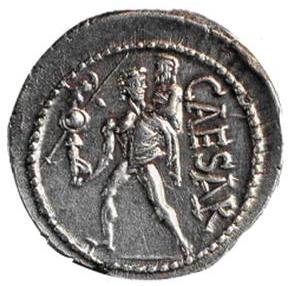 When the disastrous civil war between Pompey (e.g. the Great) and Caesar broke out in 49 B.C.E., the Jews, those not only of Rome but probably of the whole Empire, were wholeheartedly on Caesar’s side. It is not difficult to understand why. Pompey was remembered as the general who had slain many Jews in his assault on Jerusalem, who had violated the sanctity of the Temple by entering its Holy of Holies, who had enslaved many Jews and had forced upon Jewish nobles the humiliation of marching in chains behind his triumphal chariot.
When the disastrous civil war between Pompey (e.g. the Great) and Caesar broke out in 49 B.C.E., the Jews, those not only of Rome but probably of the whole Empire, were wholeheartedly on Caesar’s side. It is not difficult to understand why. Pompey was remembered as the general who had slain many Jews in his assault on Jerusalem, who had violated the sanctity of the Temple by entering its Holy of Holies, who had enslaved many Jews and had forced upon Jewish nobles the humiliation of marching in chains behind his triumphal chariot.
In return for the support which he had received from the Jews, Julius Caesar showed them his favor conspicuously, and his decrees in their behalf, which, fortunately recorded by Josephus (AJ 14. 10. 1-8. 185-216), have been called the Magna Carta of the Jews, were the foundation for the special privileges which the Jews of Rome and the Empire continued to enjoy for more than three centuries, until the rule of the Christian emperors. By these decrees they were granted full freedom of worship. The strict rules governing private association (collegia) were relaxed in the case of the Jews, who were allowed free assembly for the practice of their cult and for the holding of meals in common. They were granted permission to raise money for communal purposes and to send the Temple tax to Jerusalem. Because of their refusal to bear arms or march on the Sabbath and their insistence on special foods in accordance with their dietary laws, Caesar exempted them from compulsory military service. Special Jewish courts were recognized, so that cases involving only Jews could be tried by a Jewish tribunal instead of the regular Roman courts. No wonder that after Caesar’s untimely death (March 15, 44 B.C.E.) beneath the daggers of Brutus and his fellow conspirators, the Jews, above all others, mourned for him. Suetonius informs us (Jul. 84. 5) that for many nights after Caesar’s murder groups of Jews came to weep at the site of his funeral pyre.
After the death of Caesar, his edicts in favor of the Jews were renewed by senatorial decree and were reaffirmed by the commanders of the Roman forces in various parts of the Empire (AJ 14. 10. 9-26.)
Source: Leon, Harry J. The Jews of Ancient Rome. (p. 9-10)